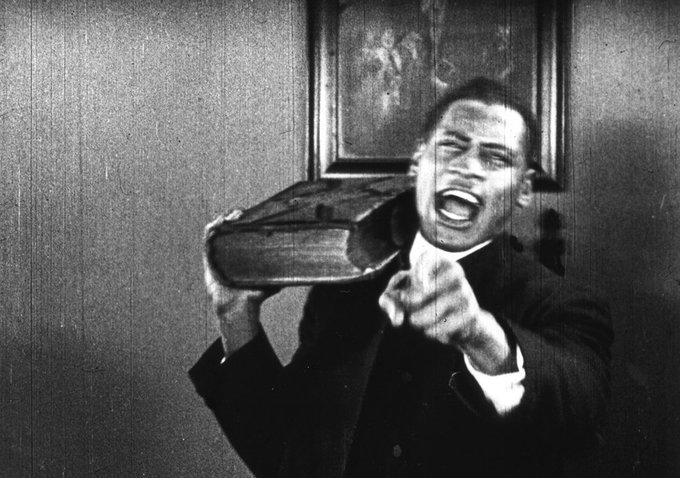Ebertfest 2016 ended on a one-of-a-kind high note with a presentation of Oscar Micheaux’s 1925 film “Body & Soul,” as accompanied by conductor Renée Baker and her Chicago Modern Orchestra Project (CMOP). A screening sponsored by Roger’s favorite fast food venture Steak ’n Shake, the experience was a fitting way to end an entire weekend of celebrating important cinema: a piece of film’s past, shared with a modern interpretation. “At one time, I would have had an objection to showing this film,” Chaz Ebert stated after its presentation. “Now, it is a part of our history, our culture, and the film history of what Oscar Micheaux did.”
The film provided a striking contrast to Friday’s silent film, Michel L’Herbier’s definitively insane “L’Inhumaine,” which was released in 1924, a year previously to “Body & Soul.” It’s like Michaeux’s film comes from a different world with its comparatively basic film language: medium close-ups, characters in the center of the frame, editing that’s assembled more than expressive. The visual scope is smaller, focusing on a love triangle between an escaped convict pretending to be a reverend (Paul Robeson in his first role), a sweet man named Sylvester (Robeson, again) and a woman named Isabelle (Julia Theresa Russell), whose mother (Mercedes Gilbert) carefully watches over her.
The films’ accompanying orchestras were curiously contrasting too. The CMOP use more standard orchestral instruments, but their blitzing scales, up and down, vocal warbles and vigorous percussion have the same presence as the Alloy Orchestra’s “junk percussion” during “L’Inhumaine.” And while the Alloy Orchestra followed a collective sense of sheet music while scoring L’Herbier’s film, the improvised but organized CMOP is about sharing wavelengths, creating a sonic experience that’s just about as rich as any ensemble, classical or jazz.
Echoing Leonard Maltin’s pre-screening statement that there are not definitive scores to silent movies, only interpretations, Baker’s version of “Body & Soul” unleashed the passion within the prolific filmmaker, and within a narrative that can be as brutal as it is melodramatic. Her conducting brings an energy to the performance, with a full-bodied control of these various pieces, directing them when to start, stop, increase, or dive deep into the moment. From my seat close to the screen, I could see that the violinists had sheet music, which they were instructed to ensue at sporadic points. The vibraphonist, however, had no such things on his stand. Did he ever? It does not matter. If you’re ever able to catch CMOP in a performance, make sure to get a seat towards the front of the orchestra pit.
A Q&A followed the screening with Chaz, critic Leonard Maltin and Baker, the latter sharing the process and creation behind CMOP. They’re a group of classical performers, with Baker herself a trained violinist, who has embraced a much less regimented way of art. “This is about developing authenticity, about expanding beyond the classical training that we all got.” Baker told of how improvisation does factor in CMOP scores, but that “it never happens unless I point to it. There’s no free-for-all going on down there. It might sound like that … but it is controlled chaos. There’s nothing better than a group of people who can read and improvise.”
Baker’s score for “Body & Soul” assuredly doesn’t often sync to the action onscreen, or shift to different characters. She said, “I see the music as a dialogue. Since there is no dialogue, I can play underneath voices. It’s a good enough film that you don’t need me to lead you, you just need me to entertain you while you’re in your seat.”
Regarding the political content of the film, and how audiences may respond to its depictions of race and gender today, Baker asserted that her stance on the score was not political. “I rarely turn these projects into political things. For me, it robs me of the creativity. It’s not that I want to be a dummy and not think about it, I just want to do the art.”












